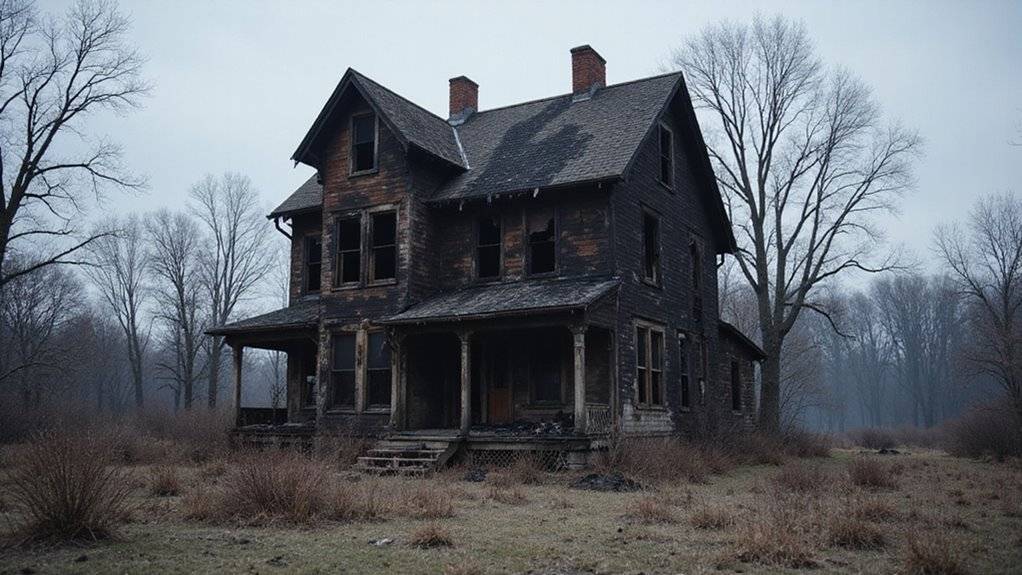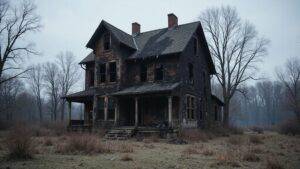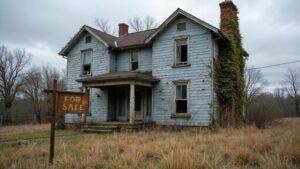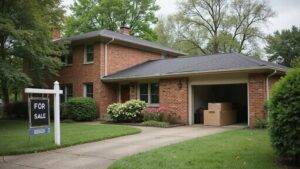Selling a fire-damaged house in Virginia can feel overwhelming. After a fire, your property may seem worthless. The damage, both visible and hidden, can scare off potential buyers. You might worry about repairs, costs, and legal issues.

This situation can weigh heavily on your mind. And the stress doesn’t stop there. Buyers may doubt the house’s safety or value. Insurance claims can be a headache. Plus, finding someone willing to take on the risk feels impossible. The longer it sits, the more you lose. But there’s hope if you know the steps.
You can sell your fire-damaged house in Virginia with the right guidance. A strategic approach turns this challenge into a win. This includes understanding damage, laws, and buyer needs. This blog will guide you through selling your fire-damaged house with ease and confidence.
Key Takeaways
- Comply with Virginia’s disclosure laws by revealing fire damage extent and affected areas to buyers.
- Price the property fairly, reflecting its condition to attract potential investors or buyers.
- Focus on critical repairs like structural safety and electrical updates before listing.
- Hire an agent experienced with distressed properties for effective pricing and marketing strategies.
- Expect longer sales timelines and offers below asking price due to buyer hesitation.
Understanding Fire Damage in Residential Properties

Fire damage in Virginia homes goes beyond what you can see. A blaze can weaken your home’s walls and foundation. Smoke and soot spread everywhere, leaving bad smells and harmful residues. Toxins from burning materials like plastics may harm your health. If not cleaned, these chemicals can linger in your space.
Discoloration and warped materials often appear after a fire. Electrical hazards might also pose serious risks to safety. Understanding these damages is vital for protecting your home. If ignored, they can lower your property’s value significantly. A thorough check is needed before taking any steps. Selling a fire-damaged home can be challenging, but cash home buyers in Virginia can offer a quick solution without requiring repairs.
What Happens When Your Virginia House Suffers Fire Damage?
When your Virginia home suffers fire damage, you’ll first need to recognize the different types of destruction, from structural issues to smoke and soot residue. Take immediate action by securing the property and contacting professionals to assess the extent of the harm. You’ll also want to start handling your insurance coverage and claims process to ensure you receive the support you’re entitled to. If selling the damaged property becomes necessary, consider a cash offer from buyers who purchase houses in any condition.
Types of Fire Damage in Houses
A house fire in Virginia can cause severe damage to both structure and emotions. Thermal Damage happens when intense heat warps beams and walls. If heat is extreme, it can weaken the home’s stability. Flames might melt materials or char surfaces, making repairs tough.
Soot Effects are another problem as smoke residue stains walls and ceilings. This residue could corrode items over time if not cleaned. A stubborn odor often lingers, which is hard to remove. Smoke can also harm HVAC systems and insulation secretly. If ignored, these issues may create health risks. Understanding such damages helps you plan recovery steps effectively.
Immediate Steps After Fire Damage
After a fire hits your Virginia home, quick action is vital to limit more harm and begin recovery. Focus on safety and emergency steps to protect yourself and your property. If authorities say it’s unsafe, don’t enter the house due to hidden dangers. Contact emergency services if they’re not involved yet. Secure your home to stop theft or extra damage.
Here’s what to do right away:
- Ensure everyone’s safety by leaving and staying out until it’s safe.
- Inform local fire officials for a proper check.
- Board up windows and doors to keep intruders out.
- Take photos of visible damage for your records.
- Find temporary shelter if your home isn’t safe.
Insurance Coverage and Claims Process
Start by contacting your insurer right after fire damage occurs. They will explain the claims process clearly. You must act fast to meet policy deadlines. Review your coverage limits to know the payout maximum. If unsure, ask your insurer for clarification.
Take clear photos of the damage for evidence. Keep records of all talks with your insurance company. Submit your claim promptly to avoid missing deadlines. If deadlines pass, you might lose compensation. Stay organized to track every step.
If the process seems tough, seek help from a professional. They can negotiate better payouts for you. When payouts are low, don’t hesitate to ask for assistance. Being proactive ensures you get deserved support.
How to Sell a Fire-Damaged House in Virginia
If you’re looking to sell a fire-damaged house in Virginia, start by assessing the extent of the damage and securing a professional evaluation to understand the full scope of repairs needed. You’ll also need to calculate repair costs, gather necessary documentation, and ensure compliance with Virginia’s disclosure laws to inform potential buyers about the property’s condition. These steps are critical to managing the sale process effectively and transparently. Additionally, consider working with cash home buyers who can purchase properties in any condition, eliminating the need for costly repairs before selling.
Assessing the Extent of Fire Damage
Curious about fire damage to your Virginia home? Start by evaluating the destruction to understand its true impact. Check walls, roofs, and foundations for cracks or warping. Look for hidden issues like smoke residue or water damage. If problems seem complex, consider forensic analysis for deeper insights. Also, assess the environmental impact on nearby areas.
Here’s what to focus on:
- Beams or supports showing structural weakness
- Smoke affecting indoor air quality
- Charred items that must be replaced
- Water damage from firefighting efforts
- Electrical systems posing safety hazards
With this knowledge, you can confidently plan the next steps for selling your fire-damaged home.
Getting Professional Damage Assessment
Why guess the damage to your fire-hit home in Virginia? A professional damage assessment gives you clear, accurate answers. Hire a trained inspector with proper Inspector Training to spot visible and hidden fire, smoke, or water issues. Their skills ensure that no problem is missed during the evaluation.
Professionals also use advanced Technology Use, like thermal imaging or moisture tools, to check structural safety. If they find issues, they detect hidden damage with precision. Their detailed report shows the full extent of the harm. This helps you decide on selling your property with confidence.
Calculating Repair Costs
After a fire damages your Virginia home, calculating repair costs is crucial. Start by getting a professional damage assessment. Then, collect detailed estimates from contractors for rebuilding. Use smart bidding to compare prices effectively. If not selling to a cash buyer like Align Real Estate Solutions, explore financing options.
Consider these key factors for accurate cost calculations:
- Structural repairs: Check damage to walls, roofs, and foundations.
- Electrical systems: Look for wiring problems from the fire.
- Plumbing damage: Inspect pipes for any heat-related issues.
- Smoke remediation: Plan for cleaning or replacing affected spots.
- Permit fees: Add costs for required local permissions.
If you calculate carefully, you’ll make better decisions.
Documentation Requirements
How can you sell a fire-damaged house smoothly in Virginia? Start by collecting all essential documents for the sale. These include insurance claims, fire reports, and repair estimates. They show the property’s true condition to buyers. If you organize them well, the process becomes easier.
Keep physical copies safe using secure storage methods. Ensure they are protected from any further harm. Also, scan documents for digital storage in a cloud system. This makes sharing with buyers or advisors simple. If issues arise, accessible records can resolve them quickly.
Thorough records build trust with potential buyers. They also prevent delays or disputes during the sale. If you miss details, problems might occur later. So, double-check everything before proceeding. A smooth sale depends on proper documentation.
Disclosure Laws in Virginia
Selling a fire-damaged house in Virginia means following state disclosure laws. You must tell buyers about the property’s condition. This includes any fire damage to prevent legal issues. Virginia requires honesty about structural problems and hazards. If there are environmental risks from fire residue, disclose them. Also, mention historical designations if they affect repairs or sales.
Key points to disclose include:
- The extent of fire damage and affected areas.
- Any repairs completed or still needed after the fire.
- Environmental risks like hazardous materials from the damage.
- Historical rules that might limit renovation options.
- Insurance claims or unresolved issues tied to the fire.
If you hide details, buyers could sue you. Always ensure complete honesty with potential buyers.
What Are Your Options for Selling a Fire-Damaged House?
When selling a fire-damaged house in Virginia, you’ve got several paths to consider based on your situation and goals. You can opt to sell as-is to traditional buyers, repair the property before listing, work with real estate agents for guidance, or sell directly to investors for a quicker transaction. Each option carries distinct advantages and challenges, and understanding them will help you make an informed decision. Additionally, selling to cash home buyers can provide a fast closing process in as little as 7 days, avoiding the delays often associated with traditional sales.
Selling As-Is to Traditional Buyers
Curious about selling a fire-damaged house in Virginia to traditional buyers? Many face this situation. Selling as-is means listing your home in its current state. It can work if you’re ready for challenges. Buyers may see potential despite the damage. Focus on evaluating offers for fairness. Also, consider incentives to attract interest.
Here’s what to know:
- Disclosure: You must tell buyers about the fire damage legally.
- Pricing: Set a fair price considering the property’s condition.
- Patience: If interest is low, expect a longer wait.
- Negotiation: Be prepared for offers below your asking price.
- Marketing: Showcase the home’s potential to draw investors.
Repairing Before Listing
Repairing a fire-damaged house in Virginia before listing can boost its appeal. It may attract more buyers quickly. Focus on key fixes like structural safety and electrical updates. Address smoke damage to ensure a safe home. Improve curb appeal with fresh paint or simple landscaping.
If you add eco-friendly features, buyers may show more interest. Consider energy-efficient windows for better marketability. Sustainable materials could also justify a higher price. Weigh repair costs against potential profits carefully. Ensure your decision makes financial sense before listing.
Working with Real Estate Agents
If you’re selling a fire-damaged house in Virginia, a real estate agent can help. They know the local market well. Their skills ensure your property is priced right, even if damaged. Agents offer marketing help and connect you to buyers. They also guide you through tricky paperwork easily.
Here are some tips to boost your sale:
- Select an agent who understands distressed properties for better plans.
- Use their contacts to reach more potential buyers quickly.
- Depend on their advice for smart pricing and offers.
- Follow their negotiation tips to get good deal terms.
- Trust their knowledge of disclosure laws to stay safe.
With a skilled agent, you can handle this tough sale confidently.
Selling to Investors
How can you sell a fire-damaged house in Virginia without repairs or long talks? Opt for investors who buy distressed homes. They offer quick closings and cash deals. This helps you avoid costly fixes and market waits. If you choose this path, expect a hassle-free process.
Investors often have varied funding sources like private money or institutional support. They can close deals fast without delays. If financing issues arise, their resources usually cover it. This ensures a smooth and speedy sale for you.
Common Challenges When Selling Fire-Damaged Properties

When selling a fire-damaged house in Virginia, you’ll likely face hurdles like price negotiations and buyer hesitation due to the property’s condition. Financing issues often arise as lenders hesitate to approve loans for damaged homes, and insurance complications can further stall the process. Be prepared to navigate these challenges with patience and a clear strategy to close the deal. Additionally, many traditional buyers may be deterred, but there are services that buy houses as-is without requiring any repairs or renovations.
Price Negotiations
Navigating price negotiations for a fire-damaged house in Virginia can be tough. Setting a fair price is challenging due to repair costs. Property stigma also affects buyer perceptions. If you use smart Haggling Strategies, justifying your price becomes easier. Mastering Counteroffer Techniques helps you tackle low offers confidently. Align Real Estate Solutions can guide you for a fair deal.
Here are key negotiation challenges:
- Estimating repair costs ensures pricing accuracy.
- Describing damage clearly supports your property’s value.
- Responding to low offers needs careful strategy.
- Weighing speed against profit shapes your decisions.
- Avoiding emotional pricing keeps negotiations rational.
Buyer Hesitation
Many buyers hesitate to purchase a fire-damaged house in Virginia due to serious concerns. They often doubt the visible damage and fear hidden issues. Buyers question if the structure is safe or if repairs are reliable. If problems persist, they worry about the property’s true value.
Risk factors also contribute to their reluctance to buy. Buyers fear future electrical issues or health risks from smoke damage. They are cautious about unexpected repair costs and complications. If you understand these fears, you can address them effectively. This approach may rebuild trust in your property’s worth.
Financing Issues
Selling a fire-damaged house in Virginia is hard due to financing issues. Buyers struggle to get traditional loans. Lenders see high risks and repair costs, shrinking the buyer pool. If the home’s value drops, equity financing may not work. Debt consolidation also fails if buyers can’t qualify for loans.
Key financing challenges include:
- Limited Loan Approvals: Banks often deny mortgages for damaged homes.
- Higher Interest Rates: Buyers face costlier loans due to risks.
- Cash-Only Buyers: Sellers may only get cash offers.
- Appraisal Challenges: Fire damage reduces the property’s value.
- Delayed Closings: If financing fails, transactions can take longer.
Insurance Complications
Selling a fire-damaged house in Virginia brings major insurance challenges. Handling claims can be tough with delays or errors. Policy lapses might occur if coverage expired before the fire. This leaves you without protection during the sale. Insurance fraud is another risk to watch for. Some buyers may make false claims or low offers. If fraud seems possible, verify all documents carefully. Ensure your policy details are clear before listing. If issues arise, consult a professional for help. Tackling these problems early can ease the sale. It also shields you from financial or legal risks.
Legal Requirements for Selling Fire-Damaged Houses in Virginia
When selling a fire-damaged house in Virginia, you must navigate specific state regulations that govern such transactions. You’ll need to ensure compliance with required inspections to verify the property’s condition and safety standards. Additionally, you’re obligated to meet disclosure requirements, informing potential buyers about the extent of the fire damage and any repairs made.
State Regulations
Selling a fire-damaged house in Virginia requires knowing the state laws and legal rules. You must follow specific regulations for property sales, especially with damaged homes. These laws promote fairness and protect both seller and buyer. If you understand Virginia’s property disclosure rules, the process becomes easier. Local ordinances, like Zoning Laws, might also affect your sale. Tax Incentives could be available for repairs or rebuilding.
Key points to remember:
- Always disclose any known fire damage to buyers.
- Follow Virginia’s real estate transaction laws carefully.
- Check local Zoning Laws for property use rules.
- Look into Tax Incentives for fixing damaged homes.
- If unsure, consult a legal expert for guidance.
Required Inspections
Selling a fire-damaged house in Virginia requires meeting legal rules with mandatory inspections. You must ensure the property passes safety checks before ownership transfer. Schedule professional assessments to spot fire-related hazards early.
Plumbing inspections are vital to detect damage in water or sewage lines. If issues exist, they could create health risks. Electrical safety checks are equally crucial for finding faulty wiring. Should exposed circuits be present, they might harm future owners. Addressing these promptly helps avoid legal troubles.
Partner with trusted experts to handle these requirements smoothly. If delays happen, they could complicate the sale process. Ensure the property remains safe for everyone involved.
Disclosure Requirements
When selling a fire-damaged house in Virginia, you must follow strict state disclosure laws. You need to tell buyers about the damage, repairs done, and any safety concerns. If you hide facts, you could face legal trouble. Transparency builds trust in real estate deals. Even with international sales, check if global rules apply alongside Virginia laws.
Consider these key disclosure points:
- Share the full story of the fire.
- Explain any structural harm caused.
- Mention unresolved insurance issues, if any.
- Highlight health risks like smoke residue.
- Confirm adherence to local safety rules.
Stay honest to safeguard yourself and the buyer.
Tips to Maximize Value When Selling Fire-Damaged Houses
When selling your fire-damaged house in Virginia, you can boost its value by focusing on key strategies like proper documentation, professional photography, strategic pricing, and effective marketing. Make sure you’ve got all repair records and damage reports ready to build trust with potential buyers, and invest in high-quality photos to showcase the property’s potential. Set a competitive price and craft targeted marketing plans to attract the right offers quickly. Additionally, consider selling to cash buyers who can purchase fire-damaged properties directly, simplifying the process and avoiding costly repairs.
Proper Documentation
When selling your fire-damaged house in Virginia, proper documentation boosts its value. You must collect all key records. This builds trust with buyers. If you organize well, transparency becomes easy. Store files securely in encrypted digital formats. Alternatively, keep them in a safe physical spot. Use good archival methods for long-term access. This prevents loss or damage.
Here’s what you need to document:
- Fire incident reports from authorities to verify the event.
- Insurance claims to display financial details.
- Repair estimates showing costs of restoration.
- Inspection reports confirming the house’s safety.
- Permits for any completed rebuilding work.
If you prepare these, your position strengthens. Buyers will appreciate your honesty.
Professional Photography
Precision in photographing your fire-damaged house in Virginia can increase its appeal. Professional photography highlights the property’s potential despite damage. Hire a skilled photographer who knows the best angles and lighting. Focus on outdoor shots to show the exterior and undamaged areas. These images can attract buyers by emphasizing curb appeal and space.
If you want to showcase interior details, consider studio portraits of salvaged items. Unique features that survived can also be captured beautifully. These controlled shots add value with a polished look. While being honest about damage, use quality visuals for balance. This approach helps your property stand out to buyers.
Strategic Pricing
To boost your fire-damaged house value in Virginia, strategic pricing is key. Price it competitively to draw buyers. Maximize returns by researching local market trends for similar properties. Set a realistic price considering repair costs. Use online sales data for pricing insights on comparable homes. If possible, get contractor estimates to support your price.
Here’s how to improve your pricing strategy:
- Check recent sales of fire-damaged homes in Virginia.
- Show buyers the potential value after repairs.
- Factor in repair budgets when setting your price.
- Explore online tools for helpful pricing information.
- Consult experts like Align Real Estate Solutions for guidance.
Marketing Strategies
Marketing a fire-damaged house in Virginia can boost its value with the right steps. Start by showcasing the property’s potential. Highlight its great location and the chance to rebuild. Use clear, high-quality photos to show the damage honestly. These images can also hint at future possibilities.
If you create Viral Campaigns, digital platforms can help a lot. Share exciting before-and-after ideas on social media. This can attract investors looking for projects. Post renovation concepts to spark interest quickly.
Influencer Partnerships might work well with local real estate experts. They can promote the house to more people. Their endorsement could build trust among buyers. This strategy may widen your audience effectively.
Lastly, team up with trusted cash buyers like Align Real Estate Solutions. They can offer a fair price easily. If paperwork feels tough, they’ll handle it for you. This makes the sale smooth and simple.
Need a Quick Solution? Sell Your Fire-Damaged House to Align Real Estate Solutions

Got a fire-damaged house in Virginia? Don’t worry about fixing it up. Align Real Estate Solutions buys properties as-is. We’re a trusted cash buyer in Virginia. Our process ensures a fast and easy sale. If you’re stressed, we’ll handle everything for you.
Here’s why we’re the right choice:
- No repairs required: Sell your damaged home without any fixes.
- Quick cash offers: We provide a fair price fast.
- Easy experience: Our team manages all the details.
- Local knowledge: We understand Virginia’s housing market well.
- Honest approach: Trust us for clear and fair dealings.
We can close in as little as 7 days based on your timeline. Reach out now for a smooth transaction!








